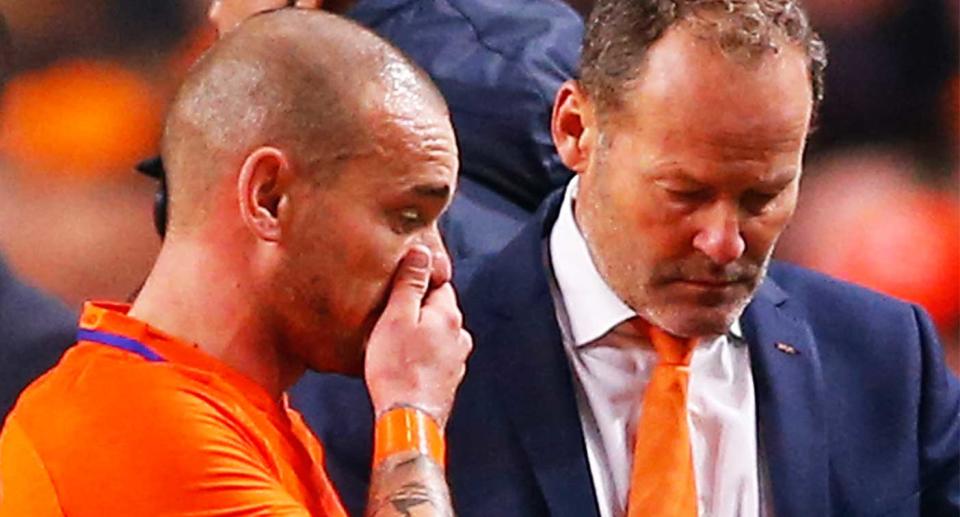Tie with Belgium can't disguise the decay of the Dutch national team

When the final whistle went during the group stage game between the Netherlands and Belgium at the 1998 World Cup, and the scoreboard still read 0-0, a deafening cheer went up from the sections of Belgian fans. This was a grand result for them, against their neighbors and arch-rivals to the north. A scoreless tie suited them just fine, although it ultimately wouldn’t be enough to advance to the round of 16.
The Dutch, after all, were at the halcyon of their golden generation, the core of which had come together at Ajax in the early 1990s, and on their way to a semifinal exit on penalties to Brazil. The Belgians, meanwhile, were a team very much befitting a country of its size — then less than 10 million.
Not quite two decades on, the balance of power has shifted rather dramatically to Belgium, whose population is a third smaller. On Wednesday, the Dutch could count themselves rather fortunate to escape from their own Amsterdam Arena with a 1-1 friendly tie. Because now the roles are reversed, and Danny Blind’s team is utterly forgettable, with an aging Wesley Sneijder, long past his prime, the only player to have ever been counted among the world’s elite. It used to be that the Dutch had two world-class players in every position. Now they can’t even muster a small handful in the entire team.
And then there’s Belgium. Gifted, brilliant, loaded Belgium, now under the instructions of a seasoned and tactically savvy manager in Roberto Martinez – who replaced the well-liked but hapless Marc Wilmots. Now it’s Belgium that has the golden generation of Eden Hazard, Romelu Lukaku, Kevin de Bruyne, Moussa Dembele, Toby Alderweireld and their many, many cohorts.
This was once the biggest rivalry for both countries, other than perhaps Holland-Germany. But Belgium has been caught in a mire of apathy that only abates periodically around major tournaments. The Netherlands, meanwhile, has stopped turning out for Oranje, disillusioned as it is with the national pride crumbling before its eyes. On Wednesday, the stadium was half-empty.
Those who stayed home didn’t miss much. Those who turned up saw a slow and flat game that was most notable for the Dutch losing three players to injury – Stijn Schaars, Vincent Janssen and Jeremain Lens. Yet against the run of play, the Dutch went ahead. Jan Vertonghen pulled Lens down by his jersey in Belgium’s box in the 37th minute.
Penalty!!!! J. Lens brought down and @KNVB has chance to go up. https://t.co/MbI1YL3nvM
— beIN SPORTS USA (@beINSPORTSUSA) November 9, 2016
And Davy Klaassen converted the penalty.
A thin @JimGaffigan doppelganger — @DavyKlaassen — scores from the penalty spot for @KNVB. 1-0. https://t.co/hFBnpvdP95
— beIN SPORTS USA (@beINSPORTSUSA) November 9, 2016
Belgium should probably have won the game. It was robbed of a penalty when Yannick Carrasco was tackled by Joel Veltman on the edge of the box, yet sliding into it.
Free kick or penalty? Did the ref get the call for this foul on @CarrascoY21 correct? https://t.co/sSBXNgKvuD
— beIN SPORTS USA (@beINSPORTSUSA) November 9, 2016
Romelu Lukaku managed to somehow mangle a pair of point-blank finishes in front of an open goal.
Good thing this is only a friendly. @RomeluLukaku9 contrives to blast the ball over from point-blank range. https://t.co/h0NxLwA1Ja
— beIN SPORTS USA (@beINSPORTSUSA) November 9, 2016
Carrasco did score the equalizer in the 82nd minute, but it took a massive deflection off Veltman’s butt to best goalkeeper Maarten Stekelenburg, who later denied Hazard after a splendid run and give-and-go backheel from Lukaku.
.@CarrascoY21 levels for @BelRedDevils with a cheeky deflected shot. https://t.co/u3YRpNrqcZ
— beIN SPORTS USA (@beINSPORTSUSA) November 9, 2016
This was probably fitting, as Belgium has had its own problems, namely with underperformance and subpar finishing.
But the entirely altered dynamic between the teams speaks as much to Belgium’s thriving academies – which have been partially centralized to give the very best prospects extra sessions several times a week, in addition to their training at clubs that have doubled down on youth – as it does to the failures of the Dutch.
If you’re wondering how a country goes from reaching the semifinals three times in five editions of the World Cup – most recently in both 2010 and 2014 – to missing out on Euro 2016 and increasingly looking doubtful for the 2018 World Cup in Russia, you have only to look at its once much-copied youth system. The Dutch, ideologues until the end, continue to believe in a slow, deliberate passing system that is behind the times. The endless square passes, and resets of attacks as the ball travels back to the defenders once again, are dated in an age of a more muscular and athletic game, in which technique nevertheless remains ample. In the Netherlands, those types of players simply aren’t produced.
They are in Belgium though.
For a few years, then-national team manager Louis van Gaal managed to cover up these deficiencies, most acutely rearing their ugly heads in defense, with his tactical nous. By fielding five defenders at the 2014 World Cup, for instance. But when he was succeeded by lesser lights like Guus Hiddink and Blind, the hairline cracks broke open into canyons.
Don’t be fooled by a 1-1 result. The Belgians have left Oranje far behind. And so have most of the other top soccer countries.
Leander Schaerlaeckens is a soccer columnist for Yahoo Sports. Follow him on Twitter @LeanderAlphabet.



